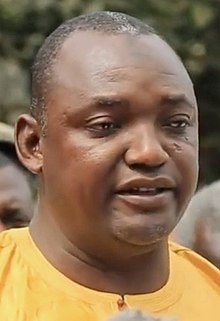Political system of the Gambia
Gambia has to the Constitution of the Gambia through a presidential system of government , which in the context of the separation of powers by the three branches of government legislation ( legislative ), executive power ( executive ) and case law ( judiciary is marked).
executive
The executive branch is headed by the President of the Republic of Gambia . The president is elected on the basis of Chapter 5 Section 3 of the Constitution. The rights, duties and powers of the President are derived from Chapter 6 Section 1 of the Constitution. The rights, tasks and powers of the President are set out in Chapter 6, Section 1 of the Constitution, whereby in particular the state policy on political, economic, social, educational and cultural issues as well as foreign policy are regulated in Chapter 20 of the Constitution.
The current president is Adama Barrow , who was elected in the 2016 presidential election. He replaced President Yahya Jammeh, who had been in office since July 22, 1994 .
On February 1, 2017, Barrow presented his cabinet . The Cabinet is composed of the President of the Republic, the Vice-President, the Secretary General and Head of the Public Service and several ministers. The rights, duties and powers of the government arise from Chapter 6 Sections 2 and 3 of the Constitution. The executive branch also includes the area of public indictments, which is regulated in Chapter 6, Section 4 of the Constitution. One of the main tasks is to be assigned to the parties, which is regulated in Chapter 5, Section 7 of the Constitution.
The Secretary General of the Government, who is also the head of the public service, has a prominent position within the Cabinet (Chapter 11, Section 1 of the Constitution). The public service area also includes regulations for the public service commission (Chapter 11, Section 2), state-owned companies (Chapter 11, Section 3) and state pension payments (Chapter 11, Section 4 of the Constitution). Government and civil service employees are governed by a code set out in Chapter 21 of the Constitution, called the Code of Conduct for Public Officers .
legislative branch
The legislative branch is the National Assembly ( National Assembly ) formed. The members of the National Assembly are elected every five years (Chapter 7, Section 2 of the Constitution). The National Assembly serves as the highest representative of the people. An independent electoral commission oversees the elections (Chapter 5, Section 2 of the Constitution). The number of constituencies is limited in accordance with Chapter 50, Section 4, Section 50 of the Constitution.
The unicameral parliament consists of 53 members. The last election took place on March 29, 2012 . In this election, the Alliance for Patriotic Reorientation and Construction (APRC), founded by Yahya Jammeh in 1996, won 51.82 percent and 43 of the 48 mandates to be elected. Five seats are awarded by the President. Parliamentary sessions are chaired by the Speaker of the Parliament ( currently: Abdoulie Bojang ), who is supported in his work by a Deputy Speaker and a Director of the Parliamentary Administration (Clerk of the National Assembly) . The tasks, rights and duties of the members of parliament as well as the rules of procedure are set out in Chapter 7 Sections 1, 3, 4 and 5 of the Constitution. The strongest faction is the Majority Leader (currently: Fabakary Tombo Jatta ). Parliament is located in the Assembly Building on Reverend Pye Lane in Banjul .
Judiciary
The tasks of the judiciary are regulated in Chapter 7 of the Constitution. For the judiciary, the Supreme Court include ( Supreme Court of The Gambia ) , by the President of the Supreme Court (Chief Justice) is conducted (Chapter 7 Section 1 and Section 2 A of the Constitution). The judiciary also includes the Court of Appeal (Chapter 7 Section 2 B), the High Court (Chapter 7 Section 2 C) and the Special Criminal Court (Chapter 7 Section 2 D). The Gambia, of which 90 percent of the population is Muslim , also has a Qādī court (Kadi Court) (Chapter 7, Section 3). The judges, whose powers and rights derive from Chapter 7, Section 4, are assisted in their work by the court administrations and the Judicial Service Commission (Chapter 7, Sections 5 and 6 of the Constitution).
Other tasks of the political system
The Gambia's public finance is regulated in Chapter 9 Section 1 and is monitored by the National Audit Office , headed by the Auditor General (Chapter 9, Section 2) and implemented by the Central Bank (Chapter 9, Section 3 of the Constitution). An independent ombudsman elected by the National Assembly serves to represent the interests of the citizens (Chapter 10).
To further state authority, the police forces (including Gambia Police Service ) and the prison service (Chapter 12) and the Armed Forces ( Gambia Armed Forces ) and the secret ( State Intelligence Services ) , whose foundations are set out in Chapter 13 of the Constitution. In addition, important state tasks are performed by the Land Commission (Chapter 14), the local government (Chapter 15) and the National Council for Civic Education (Chapters 16 and 17), but also the State Commission of Inquiry (Chapter 18 of the Constitution).
Web links
- Homepage of the National Assembly
- Homepage of the Government of Gambia (Statehouse)
- CONSTITUTION OF THE REPUBLIC OF THE GAMBIA, 1997

